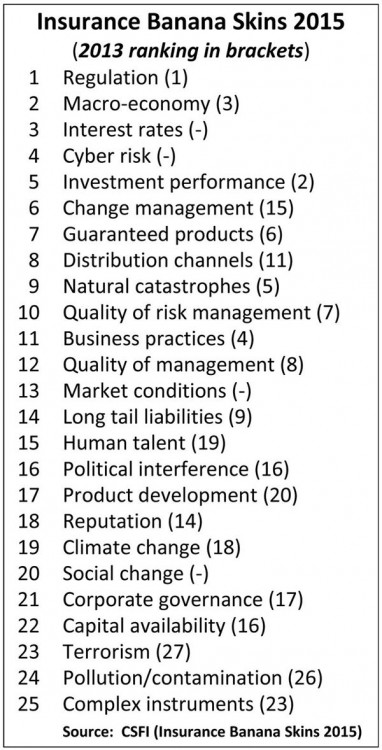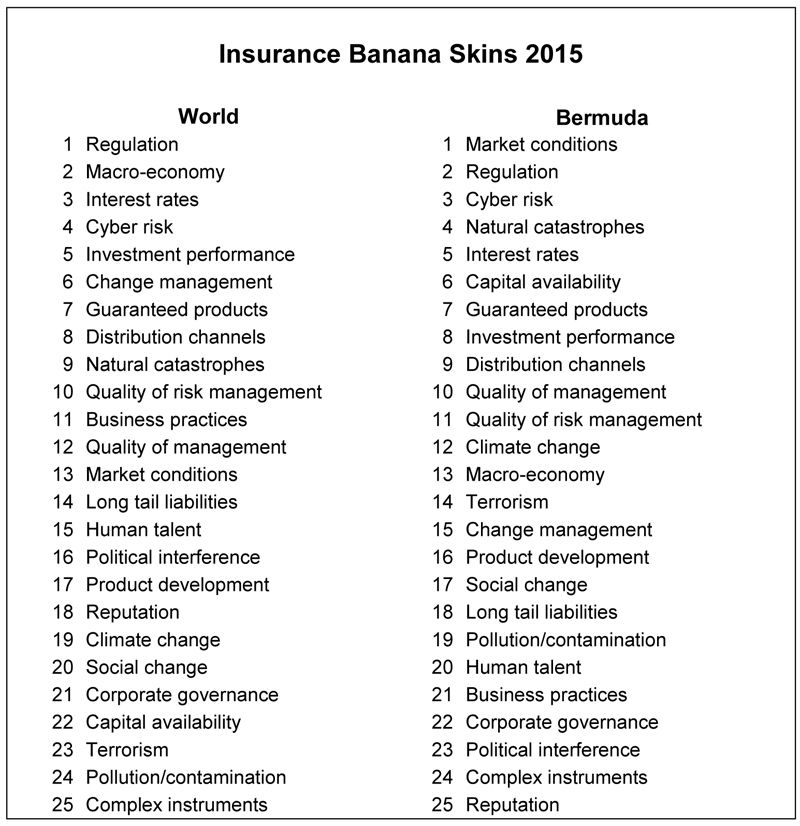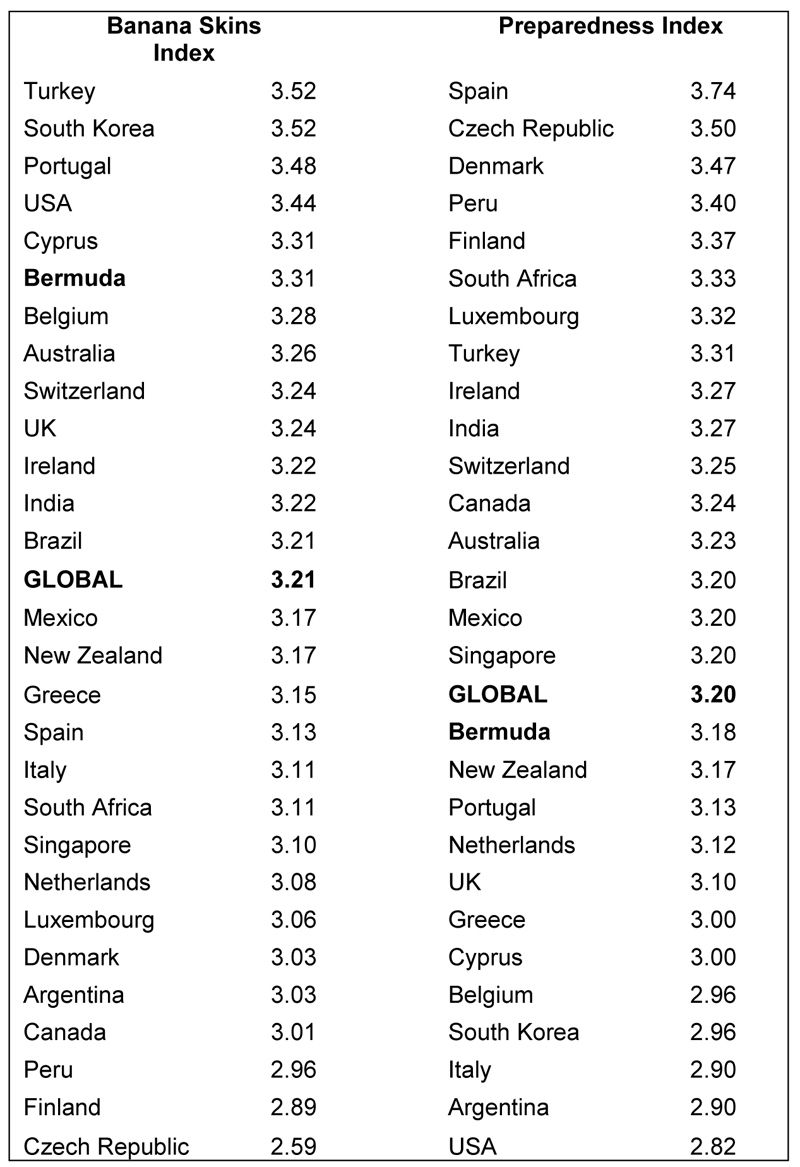PwC: Top Risks For Bermuda Reinsurance Sector
A new survey charting the top risks in the Bermuda and global insurance sector shows that cyber risk and interest rates are now among the top risks for insurers and reinsurers. Their entry, new into the rankings of this fifth successive survey, are indicative of how high a concern they have become for the industry.
The CSFI’s latest ‘Insurance Banana Skins 2015’ survey, conducted in association with PwC, polled over 800 insurance practitioners and industry observers in 54 countries, including 18 in Bermuda, to find out where they saw the greatest risks over the next 2-3 years.
 Globally, regulation emerged as the overall top risk for participants for the third successive time, underlining the deep impact regulatory change is having.
Globally, regulation emerged as the overall top risk for participants for the third successive time, underlining the deep impact regulatory change is having.
In Bermuda, market conditions were seen as the greatest risk, followed by regulation then cyber risk
“The most striking new theme to emerge from this survey is the high level of anxiety about cyber risk, specifically software failure and data security breaches,” said the Report.
“The chief concern is the security of the ever-growing volumes of data that insurers hold in cloud-based storage systems. For many, major breaches are inevitable; the question is how much damage they will cause?”
Arthur Wightman, PwC Bermuda leader and Insurance leader commented: “Cyber risk is now ranked No. 3 in Bermuda and it is the top concern in the US and UK. As an industry that handles large amounts of other people’s money and personal data, insurers are prime targets.
“As a result cyberattacks and data breaches are seen as especially urgent by the industry both from the standpoint of a threat but also as an opportunity. With material losses now in the billions, the demand for insurance to cover cyber risk has risen considerably. Notwithstanding, cyber is also an underwriting risk which has yet to be fully scoped.”
Bermuda report
A pressing concern in Bermuda was that the current soft market and an excess of capital in the industry threatened conventional business models, the report says.
Mr Wightman commented: “We’re pleased to support the CSFI’s Insurance Banana Skins initiative, which provides valuable insights into the risk concerns at the top of the boardroom agenda in Bermuda and globally.”
He continued: “The long-term prospects for insurers and reinsurers are positive as people around the world live longer and have more wealth to protect. Yet they also face the disruptive impact of new technology, changing customer expectations, more exacting regulation and enduring economic uncertainty. Insurers’ ability to identify and manage emerging as well as familiar risks will be one of the key differentiators for success in this volatile competitive environment.”
One Bermuda respondent warned “The soft market combined with low investment yields may force some in the market to chase premium”. Another said: “My biggest concern is the impact of alternative capital and the consequential rate reduction. My worry is with the additional overheads required, whether traditional reinsurers can survive in such a market”.
Underwriting risks also featured higher than they did globally. One Bermuda respondent called the threat from climate change to all business lines – general, life, and pensions – “huge”, and urged the industry to do much more to raise awareness.
On natural catastrophes, a Bermuda respondent predicted: “more extreme events in locations where they are not expected”. Cyber-crime was also mentioned as a potential underwriting risk. A respondent warned about: “Unknown coverage around who covers what and where coverage will fall in the event of a large scale attack”, adding: “Companies might look to claim on existing policies in the event that cyber is not mentioned or excluded anywhere”.
As was the case in many countries, the costs of compliance with new regulation was a frequent grievance in Bermuda, seen to be particularly disruptive to small insurers. Regulation is “a huge cost and quite likely will require changes in business practices”, said one respondent. However, other public environment risks, such as political interference and reputation, were considered much less pressing.
Notable differences between the Bermuda and the global response included:
Higher concerns:
- Capital availability: Excess capital “can cause management to do stupid things”.
- Market conditions: Persistent soft conditions put pressure on margins
- Natural catastrophes, climate change: Underwriting risks more urgent for reinsurers
Lower concerns:
- Change management: “The insurance industry does not change at the same pace as other sectors, so the risk is only moderate”
- Macro-economy: Surpassed by other concerns.
World report
Globally, the report says that new rules governing solvency and market conduct could swamp the industry with costs and compliance problems. It could also distract management from the task of running healthy businesses at a time when the industry faces radical structural change. The EU’s Solvency 2 Directive, to be introduced next year, was the focus of strongest concern, but many other countries are introducing similar measures, often modelled on Solvency 2.
Typical responses from insurance company directors included: “A sound regulatory environment is absolutely essential. At the same time, overregulation potentially strangles perfectly good and sound insurers from conducting good and sound business.”
A second cluster of concerns surrounds macro-economic risk, where respondents were cautious about the outlook for growth, as well as for interest rates. A third cluster of risks is emerging in the area of industry change, particularly the impact of new technology on security, product delivery and data management.
Cyber risk appears for the first time since the survey was initiated in 2007, and is highly placed at No. 4 overall [no.1 for non-life insurance], reflecting rapidly growing concern about cyber crime and data security. The digitisation of the industry also threatens traditional business models in the areas of distribution, new entrants and client interface. Many respondents expect to see major structural change in the industry in the coming years.
A number of risks have receded, among them the quality of management and corporate governance in insurance companies, where marked improvements are seen to have taken place. These were once ranked among the top risks facing the industry. Also declining is reputation risk as insurers become more pro-active in public relations, though the growth of social media is seen as a rising threat to reputation management.
The 2015 Banana Skins Index, which measures the level of anxiety in the industry, is at a record high despite the improving global situation. David Lascelles, survey editor, said: “The insurance industry faces enormous challenges in the growth of regulation, a difficult operating environment, and the looming threat of structural change.This is reflected in the negative sentiment behind this survey.”
The Banana Skins Index measures the average score given by each country to the 25 risks listed in the questionnaire. The higher the score, the greater is the implied “anxiety level”. The Preparedness Index measures the average response given to the question: “How well prepared do you think the insurance industry is to handle the risks you identified?” where 1=Poorly and 5=Well. The higher the score, the greater is the implied level of preparedness. Note that both indices are “self-scored”.



